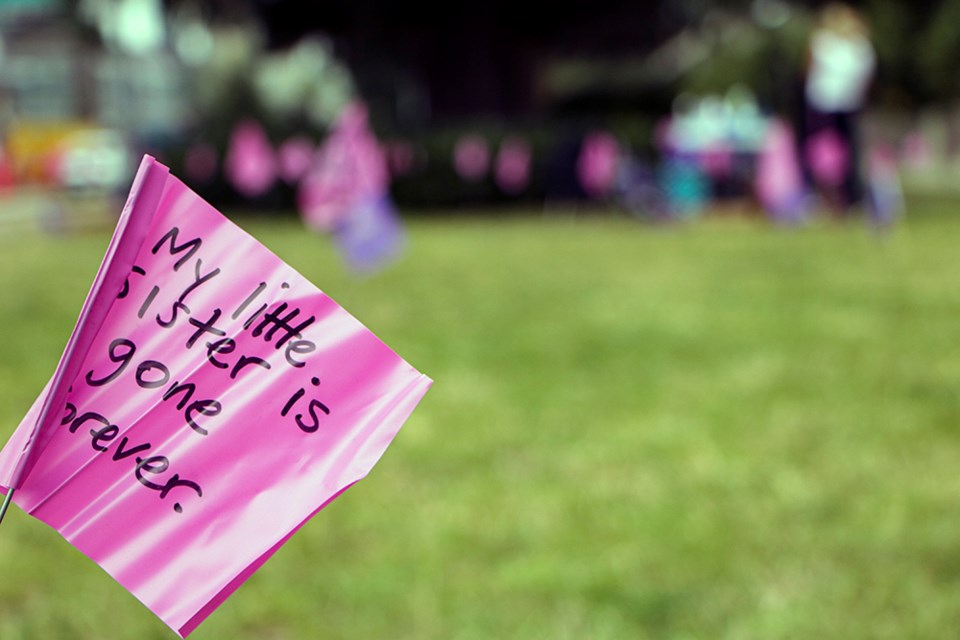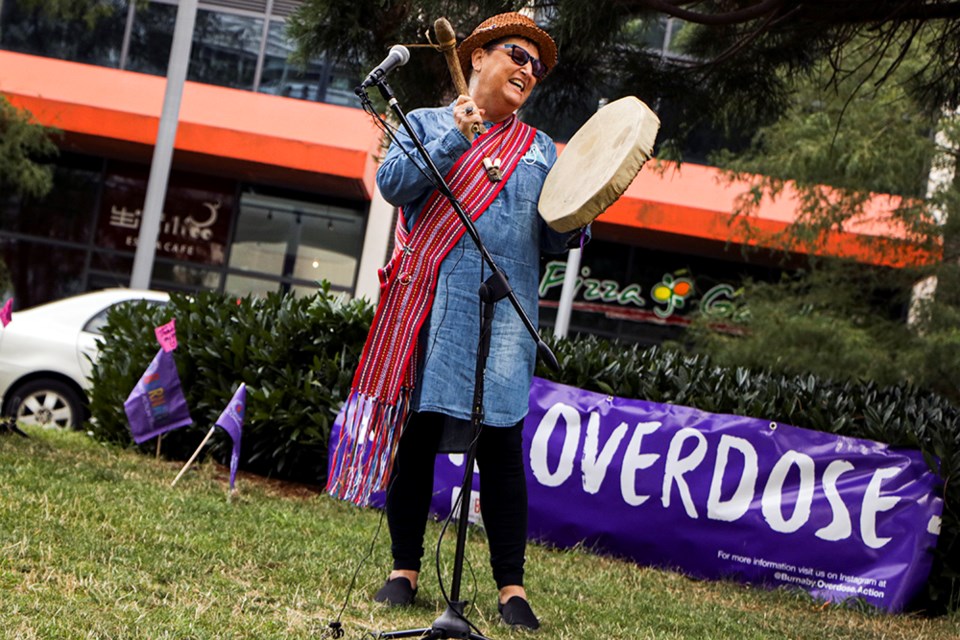No level of government is absolved, and significant work remains to be done to mitigate the deadly overdose crisis, according to a longtime advocate.
The comments were made by Sandra Laframboise, a two-spirit Indigenous elder with decades of advocacy work on the overdose crisis, at Burnaby’s International Overdose Awareness Day event at the Metrotown SkyTrain station.
The event involved a handful of speakers surrounded by a display of dozens of purple flags, each bearing a message about the overdose crisis.
Concurrent crises, including housing and food security, have fuelled substance use, Laframboise said, noting people need access to stable housing, food security and other services.
Mayor Mike Hurley noted the city has been working with BC Housing to provide housing, the city’s contribution mostly involving providing city-owned properties, but he noted the need for holistic services that meet all of the patrons’ needs.
The city has been in talks with the province, as well, to build an emergency response centre to serve people left without shelter after the warming centres closed. That centre was expected to open up by the end of July, but its location still hasn’t been finalized.
“Quite frankly, no,” Hurley said, when asked whether there has been enough urgency with that project. “It should have been opened up by now, and we’re pushing to get it open as quickly as possible.”

While the current proposed location, at the Burnaby Lake Sports Complex, would require the centre to close in December, Hurley said the key right now is to get the centre open.
“And then we’ll worry about the closing date after that. We need to get it open so that we can start helping people,” Hurley said.
In B.C. and throughout Canada, some aspects of harm reduction have seen significant boosts, including the proliferation of safe consumption sites and take-home naloxone kits. But there are two significant pieces experts in the field say are still missing: a safe supply and decriminalizing drug users.
“What we’re calling the opiate crisis is actually a drug poisoning,” Laframboise said, referring to the contamination of the drug supply with fentanyl. “Governments are complicit to murder when that happens because, for the last 30 years, many of us have been advocating for legalized safe use of drugs.”
While overdoses had been slowly declining in the year prior, those figures surged to record levels this summer, with two months straight of 175 overdose deaths. This is largely attributed to disruptions in the supply chain, leading to even greater contamination of the supply.
A safe supply involves doctors or nurse practitioners prescribing pharmaceutical heroin or hydromorphone to drug users to divert them from the contaminated supply.
A handful of drug users currently have access to a safe supply, but advocates say the initiative doesn’t go nearly far enough, with many drug users still struggling with abstinence-based therapies or opioid replacement therapies, such as suboxone or methadone.
The other major call from advocates, decriminalization, could be enacted, to varying degrees, by the federal and provincial governments. While the Controlled Drugs and Substances Act is federal legislation that would need to be repealed, the province has levers at its disposal to enact de facto decriminalization. Such was a 2018 proposal from Dr. Bonnie Henry, B.C.’s provincial health officer and top public health doctor, who has gained a cult following during the COVID-19 pandemic.
Advocates have drawn parallels between the pandemic and the overdose crisis, noting the disparity in resources to each, broadly favouring the pandemic. Similarly, while the B.C. NDP has paid significant deference to Henry during the pandemic, the government quickly dismissed her proposal for decriminalizing drug users.
But New Westminster-Burnaby MP Peter Julian, with the federal NDP, deflected blame to the federal Liberal government, which has refused to consider decriminalizing simple possession of drugs.
“I think that the B.C. government has done as effective a job as they can, given that they’re in an area of provincial jurisdiction and given that the lion’s share of the tax dollar goes to the federal government,” Julian said.
“The federal government has been very negligent as this crisis has developed.”



